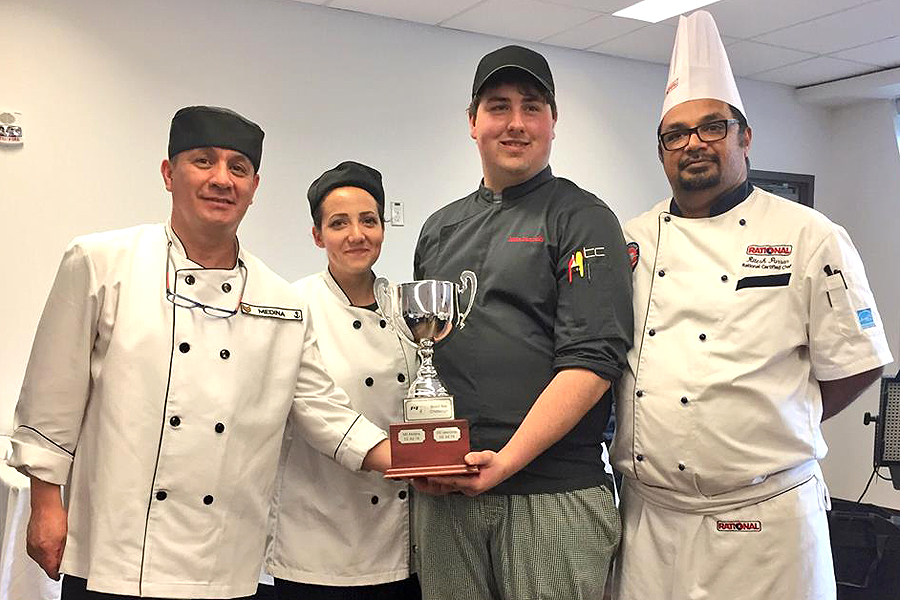Navy chefs serve up delicious victory
By Lookout on May 01, 2017 with Comments 0

The winning team: Leading Seaman Jorge Medina, Master Seaman Victoria Tavares, Michael Connelly, a culinary student from Heritage College, and Ritsh Purran, head of culinary instruction at Heritage College. Photo by Darcy Boucher, Royal Canadian Navy
Peter Mallett, Staff Writer ~
An event akin to the famous Iron Chef TV show took place two weeks ago in Ottawa, pitting navy and civilian chefs against each other to cook up a delectable win.
Battling it out in the Mystery Box Cooking Challenge were two teams of four comprised of navy chefs, a local Ottawa chef, and a culinary student from Heritage College in Gatineau, Que.
The event was held at Naval Reserve Division HMCS Carleton and was judged by local food critics and Capt(N) Steve Irwin, Director of Naval Logistics.
CFB Esquimalt chef LS Jorge Medina, who cooks for Rear-Admiral Art McDonald, Commander Maritime Forces Pacific, was on the winning team.
However, the win was not a simple fare. The two teams had to cook two courses – appetizer and main – using the secret ingredients of polenta, Jerusalem artichokes, cod, citrus fruit, shitake mushrooms, beef, and asparagus.
The winning team dished up an appetizer of Tatami beef, a variation of a traditional Japanese dish that included asparagus, balsamic vinegar and tomatoes, and steamed cod with a citrus butter sauce accompanied by ravioli served in a shitake mushroom cream sauce.
LS Medina’s teammates were Master Seaman Victoria Tavares, HMCS Carleton; Michael Connelly, a culinary student from Heritage College, and Ritsh Purran, Head of Culinary Instruction at Heritage College.
A refrigeration issue almost brought catastrophe to LS Medina’s team.
“We thought we wouldn’t be able to overcome the huge setback with the change to our appetizer course,” said LS Medina. “It created a fair degree of nervousness and as a group we were clearly agitated by the development, had short tempers, and then began to doubt our chances.”
Part of the competition included using the new combi-steam ovens that will soon be installed on board Royal Canadian Navy (RCN) ships.
Competing on the other team from the East Coast navy was Cpl Brandon Wasson, a chef aboard HMCS Toronto.
“It was a great competition between the two teams and incredibly exciting considering the slim margin of victory,” said Cpl Wasson, reffering to the .9 spread between the two teams. “I was impressed with the way they changed their recipe on the fly and recovered for the win.”
Cpl Wasson’s team created a citrus-marinated poached cod appetizer followed up by a main-course of herb-marinated grilled beef tenderloin with caramelized onion and Sunchoke bacon hash.
Both men gave favourable reviews to the combi-steam oven, which has been specially designed for the RCN by German manufacturer Rational AG, and uses healthier hot air technology to cook food instead of grilling and deep frying.
“The ovens don’t take away from the feel-good vibes of a fish and chips dinner, for example, and is still able to make the fish batter and fries crispier but with a whole lot less oil,” said Cpl Wasson.
RCN ovens get turned up a notch
The new combi-steam ovens use a combination of steam, hot air technology, and an advanced cooking system that delivers a healthier, higher quality product in a shorter period of time, says Lieutenant-Commander Deanna Wilson, Senior Staff Officer Food Services.
“It’s a very exciting project. The innovative cooking technology coming to RCN ships will modernize the delivery of food services at sea,” she says. “The combi-steam ovens will deliver food that is healthier and safer than fat frying or charbroiling, which are known carcinogens.”
LCdr Wilson says the ovens are also more energy efficient and will create less food waste than older technology currently onboard RCN ships.
The ovens were specifically designed with extra at-sea safety features to suit Kingston-Class or Halifax Class vessels. Combi-steam ovens were first introduced to the German Navy in the 1980s.
The introduction of the ovens on all Halifax-class frigates and Kingston-class Maritime Coastal Defence Vessels is expected to occur within three years with the Pacific Fleet’s HMC Ships Calgary and Vancouver expected to be amongst the first ships in the rollout. In Halifax-class vessels both deep fat fryers, the charbroilers, and griddle will be replaced by two combi-steam ovens.
Filed Under: Top Stories
About the Author:





